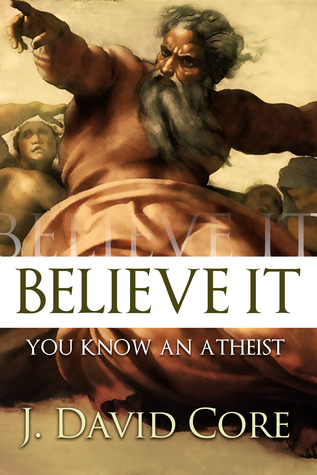By Adam Pober
J. David Core sets out to write a book to fill a specific niche: a guide for the religious to understand the atheist in their lives. His book, Believe It, You Know an Atheist, does an admirable job with a difficult subject. Most current positive books on atheism aim to offer personal stories of support to atheists or debate points to strengthen their position. This book is intended to be handed over to a believer.
The book is divided into three parts: 1 – Understanding the Fundamentals, 2 – The Common Arguments, and 3 – The Advanced Arguments. First, terms are clearly defined and put in context so believers and “their atheist” have a common vocabulary. Core writes early on that, “If you read only the first part and then quit, you’ll have a better understanding of your atheist relative or friend.” Part one lays out what an atheist accepts or rejects, and part two goes into why they do so. Part three moves beyond basic conversation and enters into debate. Each section turns a bit more confrontational in tone, though never argumentative.
The building of terms and ideas works exceedingly well. What may seem like small distinctions to a theist make all the difference when talking to an atheist. “Knowledge” and “belief” are parsed to avoid confusion and the theist belief system, and while not argued against, are put into context using “Roberts’ Rule.” Along with creating a shared vocabulary, Core does a good job at shedding the baggage that can often come with atheist/theist discussions. He presents ideas that stand well on their own, and that build on seeds planted in earlier parts.
Core gives examples that are not meant to be the final word but instead as a way of framing ideas so the theist can see it from another perspective. Arguments aren’t brought up to be won or instill doubt, but to show that the atheist’s point of view isn’t as alien to the theist as one might think.
Believe It is a great starting point for theists to understand where the atheist in their lives is coming from. Not every aspect of the underpinnings of atheism is brought up; it would take physics, philosophy, biology, and astronomy texts to do so. Rather, this is an overview that gives readers the information they need to open up a discussion with atheists, and to ask themselves questions about their own beliefs.
Adam Pober works in a library as a bit of a pantologist during the day. He’s had both fiction and non-fiction published, and has co-written a few independent films. A voracious fan of all types of media, he balances original work with criticisms.
Thank you, Adam!


I appreciate that someone has written a book on this topic. As someone with people close to me who are atheists, I have learned the hard way what not to say. It comes down to educating ourselves about the viewpoints of others, with the desired goal of respecting the feelings of those around us, even when their beliefs differ from our own. Perhaps there should be a “Robert’s Rule” for the many facets of life where we find ourselves embroiled in controversy because someone doesn’t think as we think. I say this only half-jokingly.
Hi, what have you learned not to say you those close to you who are atheists? Just curious.
I’ve learned not to say, “you might change your mind someday.” That’s a classic “script” that is also directed at women who say they don’t want kids. I’ve also learned not to share my perception when I feel a higher power is at work in my life. I said that to someone, and my viewpoint was turned right around on me. Nonbelievers are definitely in the minority, and sometimes they react with anger at a world that treats them as though they are “less than.” Which I apply to the lives of women without children, who are treated “less than” if they don’t want/cannot have kids. We are all worthy of integrity and respect, despite if we fall within a minority. And there are many categories of minority. Atheists are one more minority and one that gets treated poorly too often. Although I saw a poll in Time magazine that only half of Americans believe that “God is Essential to Morality.” So I think that’s a step in the right direction!